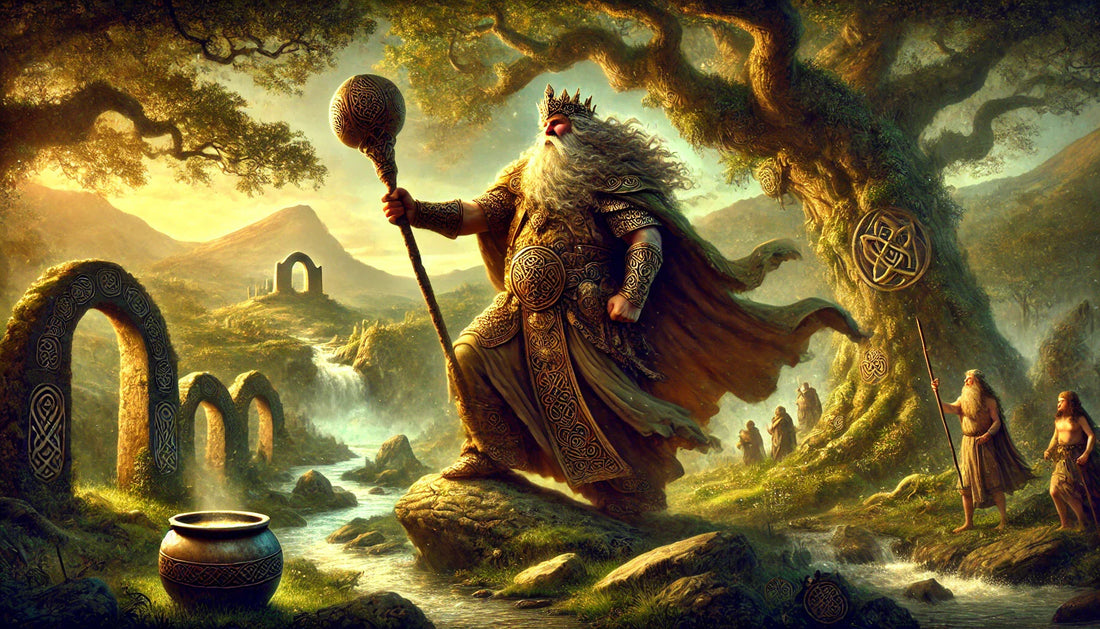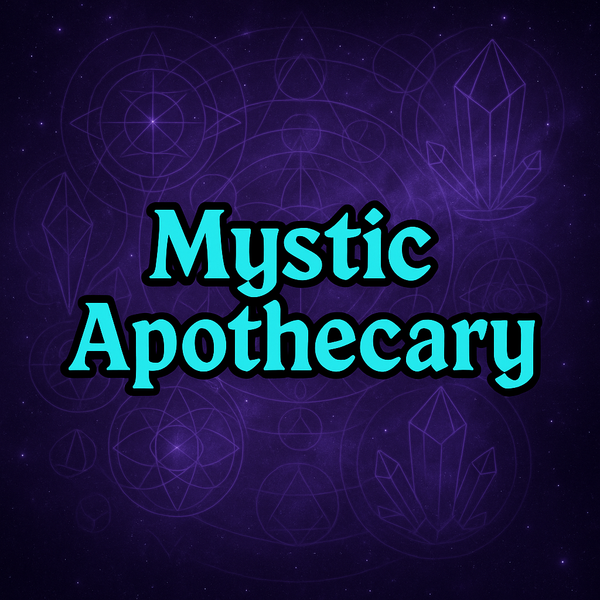
The Dagda: Irish God of Strength and Abundance
Cody ManesShare
The Essence of the Dagda
The Dagda, often called "The Good God" in Irish mythology, is one of the most powerful deities of the Tuatha Dé Danann. A god of abundance, strength, and wisdom, he is a master of magic, a protector of the land, and a bringer of prosperity. As a fatherly figure and provider, the Dagda symbolizes balance, generosity, and primal power. He is also known for his boundless knowledge, often depicted as possessing deep understanding and foresight beyond mortal comprehension. In many legends, his wisdom is so profound that even other deities seek his counsel, further solidifying his role as a leader and guide. His presence in Irish mythology extends beyond battle and bounty, as he is also linked to music, poetry, and craftsmanship, showcasing his ability to create as well as protect. Through his tales, he exemplifies not only physical might but also intellectual and spiritual mastery, making him a revered and complex figure in Celtic tradition.
The Legend of the Dagda
A central figure in Irish mythology, the Dagda plays a significant role in the Mythological Cycle. His name, meaning "Good God," reflects not moral virtue but his mastery over many domains. He is often depicted as a robust, larger-than-life figure with an insatiable appetite for food, drink, and life itself. His feasts were legendary, symbolizing his role as a provider of nourishment and abundance. In addition to his great physical presence, the Dagda was known for his strategic mind and keen insight, which he used to outwit enemies and ensure the survival of his people. His character blends humor, power, and wisdom, making him one of the most human-like gods in Celtic tradition. Unlike many other deities, he was not distant or untouchable—his actions and demeanor demonstrated both immense power and a deep understanding of human nature. His interactions with mortals and gods alike were often marked by cleverness and an ability to navigate even the most challenging situations with a balance of strength and intellect.
The Dagda possesses magical items that represent his diverse abilities. His club of life and death can slay enemies with one end while restoring life with the other, signifying the delicate balance between destruction and renewal. His cauldron of abundance never empties, symbolizing nourishment and prosperity, and was said to provide sustenance to all who approached it, reinforcing his role as a provider and benefactor. His enchanted harp, Uaithne, controls the seasons and emotions, demonstrating his command over balance and harmony. The harp was not merely an instrument but a powerful tool of influence, capable of inspiring warriors, soothing the grieving, and even compelling nature itself to obey his will. The Dagda’s mastery over these artifacts illustrates his role as a ruler of life’s fundamental forces, ensuring equilibrium between creation and destruction, chaos and order.
One of his most famous stories is his role in the Second Battle of Mag Tuired, where the Tuatha Dé Danann fought the Fomorians. As a leader and protector, he used his wisdom and strength to guide his people to victory, employing both strategy and supernatural power to ensure their triumph. He played a crucial role in preparing his warriors for battle, using his knowledge of the land and the enemy’s weaknesses to turn the tide in favor of the Tuatha Dé Danann. His connection to the cycles of nature and the divine realms made him a powerful force in war and peace alike. His union with the goddess of sovereignty further solidifies his role as a guardian of fertility and abundance, symbolizing the sacred bond between the land and its rightful rulers. This union not only reinforced his authority but also ensured that the land remained prosperous, reflecting the interconnectedness of leadership, prosperity, and divine favor.
Symbolism and Spiritual Significance
The Dagda embodies the principles of abundance, strength, and wisdom. As a god of fertility and nourishment, he represents the endless bounty of the land and the importance of generosity. His cauldron serves as a reminder of the rewards of sharing and nurturing others. Beyond material prosperity, the Dagda’s influence extends to the well-being of communities, fostering unity and cooperation among his followers. His presence in myth reflects the essential role of leadership in ensuring stability and the fair distribution of resources. He also teaches that true abundance is not solely about physical wealth but includes knowledge, kindness, and the strength to protect those in need. His legacy continues to inspire those who seek a deeper connection with both nature and the divine forces that govern the cycles of existence.
His club represents the duality of destruction and restoration, reflecting the cycles of life, death, and rebirth. This sacred weapon not only enforces divine justice but also ensures the continuation of existence through renewal. His harp, which governs the seasons and emotions, signifies harmony and interconnectedness, with its melodies capable of shifting moods, invoking inspiration, and guiding the natural order. These symbols highlight his role as a balance-keeper and a force of primal energy, emphasizing his ability to unite seemingly opposing forces and maintain cosmic equilibrium. Through his mastery of these artifacts, the Dagda reminds us that destruction is necessary for transformation and that harmony arises from the acceptance of life’s inevitable cycles.
As a fatherly figure and protector, the Dagda encourages responsibility, strength, and compassion. He embodies the wisdom of leadership, teaching that true authority is rooted in care and fairness rather than mere dominance. His connection to the earth reminds us of the importance of honoring nature, cultivating abundance, and living in harmony with the land. The Dagda's bond with the changing seasons and fertility cycles reflects his deep understanding of balance, reminding us that prosperity is achieved through respect for the rhythms of existence. His lessons encourage not only individual growth but also the nurturing of strong, supportive communities where generosity and resilience thrive.
Emotional and Spiritual Benefits of Working with the Dagda
The Dagda’s energy instills security, empowerment, and emotional balance. He offers guidance during hardship, reminding individuals of their capacity to persevere and provide for themselves and others. His influence strengthens resilience in times of uncertainty, fostering a deep inner fortitude that allows individuals to overcome obstacles with confidence. His presence encourages gratitude for existing abundance while inspiring the manifestation of prosperity and joy. By aligning with his energy, one can develop a sense of grounded stability, recognizing that true wealth extends beyond material gain to encompass emotional fulfillment, personal growth, and the strength to uplift others in times of need.
His wisdom fosters emotional resilience and a deeper connection to life’s natural cycles. By understanding the ebb and flow of existence, individuals can develop patience and adaptability, learning to navigate challenges with grace. Embracing both strength and compassion allows individuals to cultivate confidence, balance, and harmony within themselves and their relationships. This duality teaches that true power lies in the ability to remain steadfast in adversity while maintaining an open heart, fostering meaningful connections with others and a deep reverence for the forces that shape the world around them.
Protective Qualities of the Dagda
As a protector of his people and the land, the Dagda is a formidable guardian. His strength and magic help overcome challenges, safeguard loved ones, and restore balance in chaotic times. Not only does he wield immense power, but his protective nature extends beyond physical defense to include guidance and wisdom, offering his followers the knowledge needed to navigate difficult situations. His club symbolizes his ability to dispel negativity and heal wounds, offering protection on physical, emotional, and spiritual levels. Legends speak of his capacity to shield entire communities from misfortune, reinforcing his role as a nurturing yet fierce defender of those who seek his aid.
For those seeking security and guidance, invoking the Dagda in rituals or meditations provides grounding and assurance. His energy fortifies intentions, strengthens resolve, and fosters resilience, creating a protective presence that enhances clarity and inner stability. Engaging with his wisdom can help individuals recognize their own strength, reinforcing the courage needed to navigate uncertainty. Through devotion and mindful practice, one can develop a deep connection with the Dagda’s enduring support, embracing his teachings of perseverance, abundance, and harmony in all aspects of life.
Practical Ways to Work with the Dagda
Honoring the Dagda can be done through rituals, meditation, and mindful practices. Create an altar featuring symbols of his power, such as a cauldron, a club, or a harp, and adorn it with elements that represent the natural cycles he governs, such as seasonal flowers, grains, or sacred stones. Offerings of hearty foods like bread, milk, honey, or ale resonate with his love of abundance and nourishment, while reciting prayers or chants in his honor can further strengthen the connection. Engaging in acts of generosity, such as sharing meals with others or offering aid to those in need, aligns with his values and invites his blessings into daily life. Additionally, storytelling, music, or artistic expressions that celebrate his myths and virtues serve as meaningful tributes, allowing practitioners to embody his wisdom and strength in a deeply personal way.
Meditating on his qualities of strength, wisdom, and generosity can invite his energy into daily life. By focusing on his presence, individuals can cultivate a sense of inner power and clarity, enabling them to approach challenges with greater confidence and resolve. Visualizing his guidance through obstacles fosters resilience and encourages proactive decision-making, helping one to manifest abundance and balance in all aspects of life. Spending time in nature, particularly in fertile or forested areas, enhances this connection, allowing one to absorb the earth's energies and attune to the natural rhythms that the Dagda himself embodies. Engaging in mindful practices such as grounding exercises, breathing techniques, or rhythmic drumming can further deepen this spiritual bond, creating a harmonious link between the self and the divine.
Practicing gratitude also strengthens the bond with the Dagda. Acknowledging the blessings in one’s life fosters a deeper sense of connection with his energy, reinforcing the principles of reciprocity and abundance. Engaging in acts of kindness, whether through charitable giving, mentorship, or simple gestures of appreciation, mirrors his benevolent nature. Expressing gratitude through ritual offerings, written reflections, or verbal affirmations can further align individuals with his presence, inviting continued prosperity and protection.
Embracing the Dagda's Wisdom
The Dagda, the Irish god of abundance, strength, and wisdom, serves as a guiding force for those seeking stability and prosperity. His influence extends beyond mere material wealth, touching upon the cycles of renewal, the resilience of the spirit, and the transformative power of generosity. With his deep connection to the land and its rhythms, he embodies the sacred interplay between nature and humanity, teaching that true abundance is found in balance and reciprocity. By honoring the Dagda, we not only invite his protection and wisdom into our lives but also align ourselves with the natural ebb and flow of existence. Explore Mystic Apothecary’s offerings to strengthen your bond with the Dagda and embark on a path of growth, strength, and spiritual enrichment.
Ready for more? Dive into our next topic: The Tuatha Dé Danann
